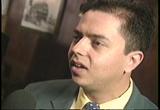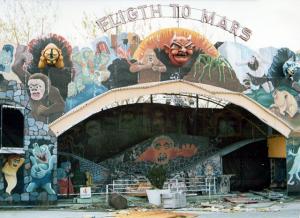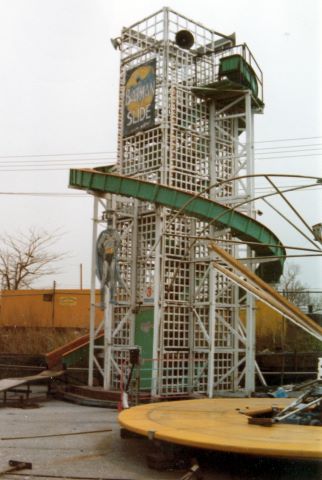Notice how, unlike every other website in the world, I had nothing about the 9/11 anniversary yesterday? That was by design. I always like to be different.
Now, though, a few words about 9/11. The first thing I remember from that day was Andrea holding out the phone to me, saying, “It’s Steve.” I’d slept in, and he called to talk to Andrea about some work-related thing. To me he said (knowing I’m from New York), “I hope you didn’t know anyone in the World Trade Center.”
I couldn’t parse his statement. At that moment, in my mind, which was still foggy from sleep, the Twin Towers still stood. “Didn’t know anyone in the World Trade Center when?”
Steve must have been surprised that I hadn’t heard the news. (Neither had Andrea, for that matter.) “The World Trade Center is gone.”
This made as little sense to me as his first statement. “Gone? What do you mean?”
“The Twin Towers collapsed. They’re gone.”
Nothing could be clearer than what he was telling me, but I still asked him to clarify two or three more times. Not until a minute later, when I turned on the news and saw smoke plumes where the Twin Towers had stood, did I really understand what Steve had been saying.
Andrea was pregnant with our first son. I told Andrea the news, slightly fearful of the effect it could have on the pregnancy. (None, thankfully.) Then of course we were obsessed all day with finding out more, like everyone else in the world.
It’s only five years later but it’s already hard to summon up exactly the feelings of dread and suspicion that descended everywhere at that time. That very night, walking Alex along a side street in Mill Valley, I saw a man sitting in a parked car in the dark. A terrorist! A few weeks later I had to drive to Santa Clara for a job interview and I took the long way (around the San Francisco Bay) rather than cross the obvious-terrorist-target Golden Gate Bridge.
American flags sprung up everywhere. I told Andrea I wanted to hang one outside of our window to show solidarity with our fellow citizens, but I never did because even in the earliest days, the flag was transforming from a symbol of national unity to one of creepy jingoism.
After the Supreme Court decision that had handed the presidency to Bush, public discourse on the subject of that bizarre election and its bizarre conclusion had shut down completely. To me and Andrea and others who viewed it as a high crime against our beloved democracy, it was a maddening time. Only in the few weeks immediately preceding 9/11 did that freeze begin to thaw. A couple of books on the subject, one by Alan Dershowitz and one by Vincent Bugliosi, had appeared on the New York Times bestseller list. We’d even gone to hear Bugliosi speak in Oakland just a day or two earlier. Of course 9/11 obliterated the national discussion of Election 2000.
In the immediate aftermath of 9/11 (when the death toll was still unclear and the exact workings of the Bush west wing were not yet known) I wrote the following. (Rereading it now, it’s depressing to be reminded that my sense of outrage was already exhausted five years ago. Just as I’ve learned about physical exhaustion from having first one child and then two, no matter how exhausted you think you are, there will be a time in the future when you’ll look back and say, “That was nothing!”)
It’s George W. Bush’s world. We just vote in it.
Just when it looked like George Bush would finally learn that political actions have consequences, he showed us again that the normal rules don’t apply to him
Bill Clinton should have been a hard act to follow. A Rhodes scholar and a professor of Constitutional law who pulled himself up from poverty and abuse to lead his country and the world through the most prosperous period in human history, his Vice President nevertheless couldn’t use his boss’s accomplishments to advance his own campaign for fear of being tarnished by the public’s distaste for Clinton’s personal weaknesses.
Instead, we got a lazy son of privilege who can’t find a grammatical sentence with two hands and a flashlight; who partied on drugs and women ’til he was embarrassingly old, deserted his military post, ran a healthy business into the ground, boasted about his mediocre school grades and about napping through his term as Texas governor, wiped out a record budget surplus at a single stroke, and alienated our international friends — and he’s enjoying the highest presidential approval ratings ever recorded.
A whole lot of Americans have been in a permanent state of astonishment regarding Bush’s residence at 1600 Pennsylvania Avenue. Our jaws only dropped further when Bush audaciously populated his administration with hardliners and old Reagan-era cronies, rather than exhibiting the humility and conciliation called for by an incredibly close election (which, numerically, he lost).
Before September 11th, things were starting to look pretty good to Bush-bashers. Polls showed Bush’s mishandling of the economy was coming home to roost. Democrats were beginning to dictate the agenda. Bush’s beloved boondoggle, the missile shield, looked like it wouldn’t even survive one round of budget negotiations. Discouraged Republicans in Congress were announcing their retirement. A tasty scandal was brewing around Vice President Cheney and the possibility of oil-industry influence-peddling. Books taking the GOP and the Supreme Court to task for their roles in the aftermath of Election 2000 were bestsellers, and there were faint stirrings about Supreme Court impeachment investigations.
It looked like there was justice after all. We never doubted (some of us began to say with satisfaction) that someone so monstrously underqualified for the most powerful office in the world would reveal the depth of his ineptitude sooner or later, or that there’d be a hefty political price to pay for taking the solemn role of President of the United States so lightly, as if it were an extracurricular activity he could use on his college application.
And then terrorists attacked America, and it became George Bush’s world again. In the midst of the shock and the grief of September 11th, there was still one other sentiment on the lips of almost everyone I talked to: “…and this is the man we have to lead us through this?” Even as reviled mayor Rudolph Giuliani emerged as the man showing Bush and the world what leadership in a crisis is all about; even as Bush, in his few photo-op appearances, uttered barely a single unscripted word (except perhaps for “There’s a poster out West, it says ‘Wanted Dead or Alive’” — followed by an almost-audible round of exasperated forehead-slapping in the west wing); even amidst widespread unease about the massive retaliation Bush initially promised, the country lined up dutifully behind its president.
Which is as it should be, I suppose. Demolished buildings, 7,000 dead Americans, and murderous fanatics still at large, is serious — a lot more serious than whether the President has to backpedal on his promise not to touch Social Security funds. This is no time to be undermining the strength of the Oval Office.
And yet… my exhausted sense of outrage is crying feebly, “He’s doing it again.” He’s escaping judgment. He’s escaping even the discussion of judgment. Reagan may have been the Teflon president, to whom no accusation could stick; but Bush has gone him one better: like Keanu Reeves dodging bullets in The Matrix, nothing even touches him in the first place. History will probably forget that Bush ran the economy into the ground; it’ll record that a coordinated terrorist attack plunged the country into recession. No one’s interested now in asking Dick Cheney the tough questions about his energy policy — even though, if suspicions about oil executives dictating policy are true, it’s a gigantic abuse of the public trust. The Supreme Court didn’t murder 7,000 people in Bush v. Gore, but their figurative violence against the Constitution was comparable — and now it’s highly unlikely they’ll ever be made to answer for it.
What luck for Bush. And it may just be that sheer luck is what we need in a leader right now. That, and a certain reckless faith in the ability to coast through adversity. But unless he sheds some of his magical protective aura on the rest of us, I worry that we’ll start dropping bombs at the direction of a man who never learned that actions have consequences.
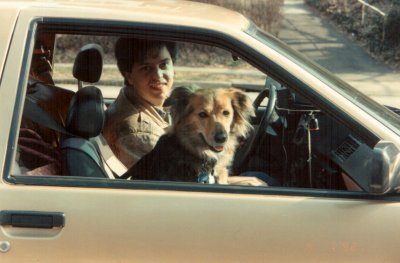

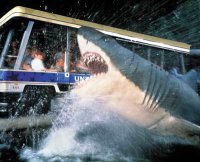 All of which was interesting enough to think about that it prompted me to begin writing this blog post, which in turn prompted me to look up
All of which was interesting enough to think about that it prompted me to begin writing this blog post, which in turn prompted me to look up  Soon after that, the IMDb was acquired by
Soon after that, the IMDb was acquired by 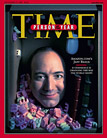 It was agreed that I would bring the new IMDb and Amazon trophies to Seattle on my next trip and deliver them to Amazon founder
It was agreed that I would bring the new IMDb and Amazon trophies to Seattle on my next trip and deliver them to Amazon founder 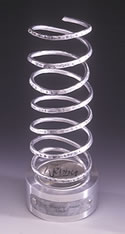 He admired the attractive trophies, likening their design to DNA, and I pointed out that they’re each a single helix, so they’re more like RNA. This elicited another laugh, and I found myself thinking that [another CEO I knew] wouldn’t even get it if I said that to him, let alone find it funny.
He admired the attractive trophies, likening their design to DNA, and I pointed out that they’re each a single helix, so they’re more like RNA. This elicited another laugh, and I found myself thinking that [another CEO I knew] wouldn’t even get it if I said that to him, let alone find it funny.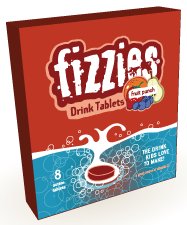 Now they’re back again in
Now they’re back again in 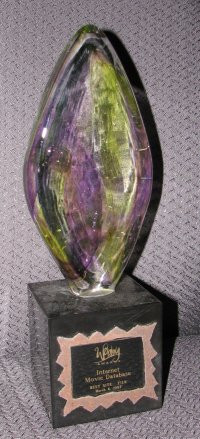 The trophy itself was ugly as sin and tremendously heavy — cubical black base made of solid neutronium, near as I could tell, with a badly-etched plaque stuck on it and supporting a freakish oblong colored glass ovoid, which actually looked kind of cool at one point when I set it down on a table and some light came from behind it. The fifteen winners hefted their trophies around the club like Sisyphus. Some who weren’t careful enough with theirs found that the glass ovoid snapped easily off of the base.
The trophy itself was ugly as sin and tremendously heavy — cubical black base made of solid neutronium, near as I could tell, with a badly-etched plaque stuck on it and supporting a freakish oblong colored glass ovoid, which actually looked kind of cool at one point when I set it down on a table and some light came from behind it. The fifteen winners hefted their trophies around the club like Sisyphus. Some who weren’t careful enough with theirs found that the glass ovoid snapped easily off of the base.